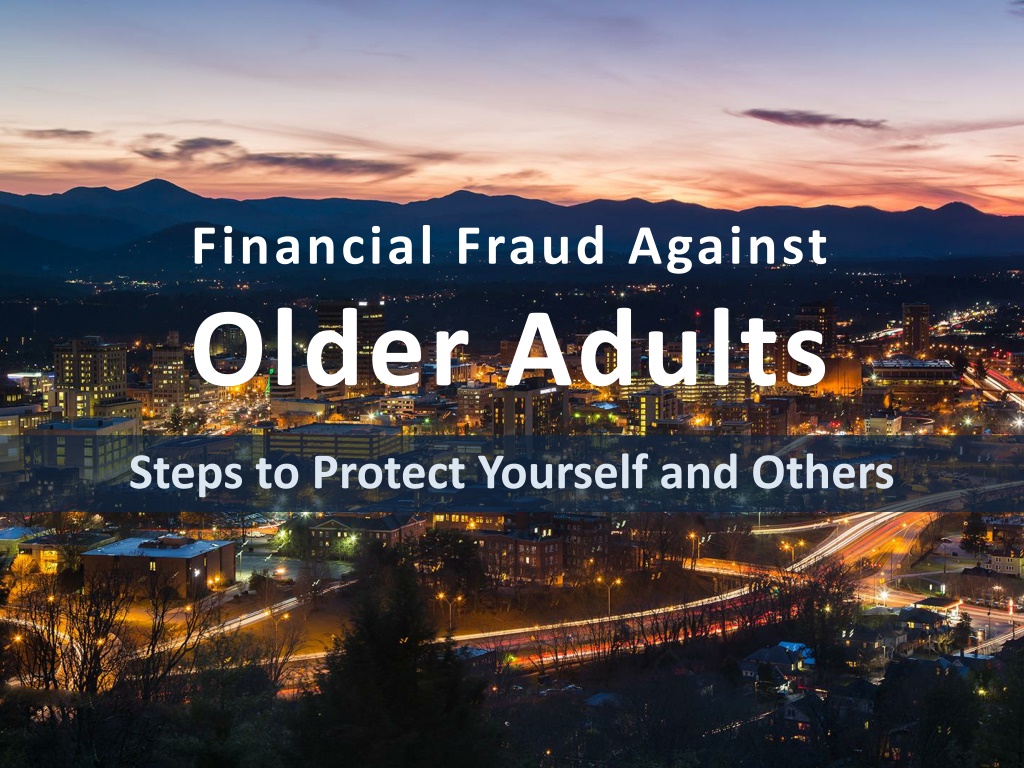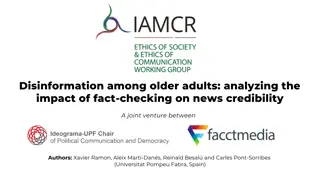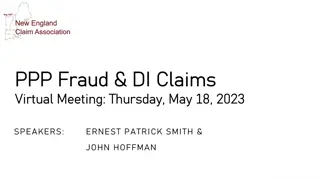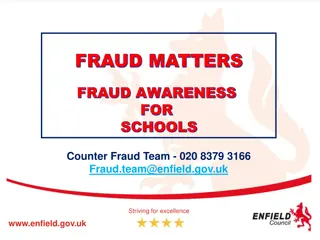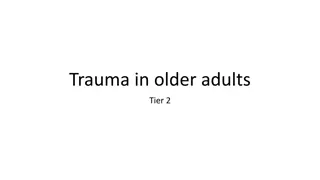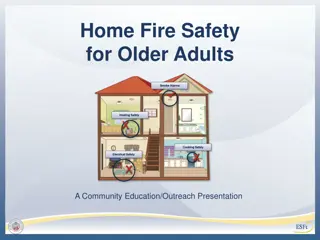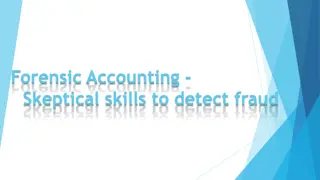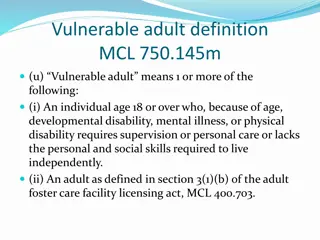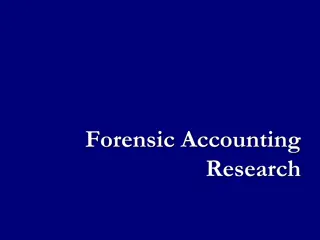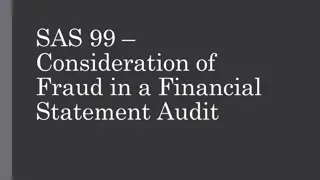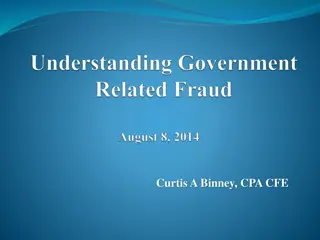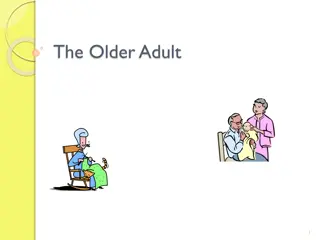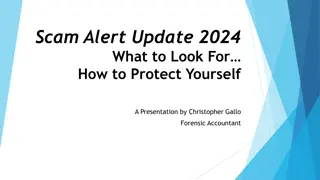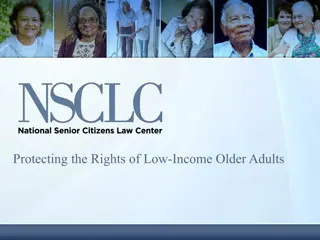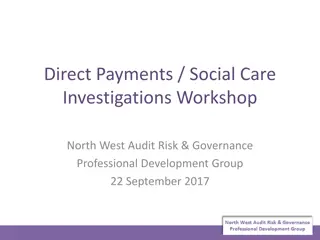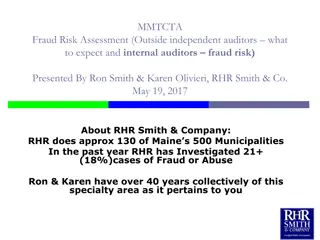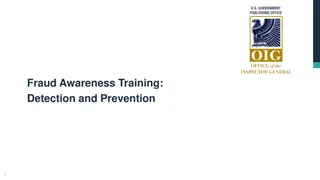Financial Fraud Against Older Adults: Steps to Protect Yourself and Others
Senior citizens are particularly vulnerable to various types of financial fraud, resulting in significant financial losses each year. Common scams include telemarketing fraud, in-person service scams, and exploitation through power of attorney. Factors like social isolation and cognitive impairment make older adults easy targets. It's crucial for seniors and their loved ones to be aware of these schemes and take preventive measures to safeguard against financial exploitation.
Download Presentation

Please find below an Image/Link to download the presentation.
The content on the website is provided AS IS for your information and personal use only. It may not be sold, licensed, or shared on other websites without obtaining consent from the author. Download presentation by click this link. If you encounter any issues during the download, it is possible that the publisher has removed the file from their server.
E N D
Presentation Transcript
Financial Fraud Against Older Adults Steps to Protect Yourself and Others
Faces of Fraud Mrs. A, age 88, got a 7:00 a.m. call from someone claiming he was her grandson. He said he had been arrested in Mexico, not to tell his parents, and he needed $3000 to post bail. After Mrs. Bell paid by Western Union, she got another call from the grandson s lawyer asking for $4000 in legal fees. After discovering the scam, she wondered, How did they know my grandkids call me Meemaw ?
Faces of Fraud Mr. Swartz, age 60, was already retired and living on a tight income when he got a call saying he had won a contest. He just needed to fill out a money order to claim his winnings. The telemarketer, a company called National Health, began charging his account $19.95 a month. By the time he stopped the charges, his account was overdrawn and the company had referred him to a collection agency, ruining his credit. Now he works at Wal-Mart. I ll work until I die, he says.
Faces of Fraud Ms. Cooper, age 86, gave her friend Mrs. Baum Power of Attorney and a loan of $3,000. Using the Power of Attorney, Mrs. Baum withdrew another $214,000 from her account, never paying her back. Tests later found Ms. Cooper was already experiencing the start of dementia. Sources: NY Times, local testimonials
Fraud Facts Americans lose $40 billion a year from telemarketing fraud alone. Senior citizens are about six times more likely to be targeted. 40% of reported scams are by phone, 33% are by email. About one- quarter are by mail or in-person. Banks and money transfer services like Western Union and prepaid cards are witting and unwitting accomplices.
Why Seniors? More likely to have savings and home equity. More likely to use landline phones. Less wary about new technology. Scammers use social media, spoofing and phishing , and websites like Google Street View to learn more about you. Spoofing : Making a caller ID or email seem to come from a trusted source. Phishing : Using a misleading link in an email to steal information or install malicious software. More socially isolated and worried about savings ( Need to hit a home run .) Possible hearing or cognitive impairment.
Types of Scams In-person service scams: The scam: Someone knocks on your door offering a service you didn t know you need. Driveway treatment, removing dead trees, magazine subscriptions and home repair are most common. The risk: The person could overcharge you for something you don t need, they could take prepayment for supplies and not return, they could scope out your home and rob you or break in later. What to do: Always get a second opinion and estimate. Don t open the door if you re alone or suspicious. Get a No Soliciting sign. Call the police and report.
Types of Scams Common Phone Scams: Duke Power IRS Sheriff or Police The scam: A caller from a seemingly real business or service says you are late making a payment. To avoid a penalty, you must give bank information over the phone or purchase a prepaid debit card and give them the numbers. May use spoofing to trick Caller ID. The risk: These scams frequently succeed in getting $250 to $500 from victims. If you fall for it, you may be targeted for escalating reload scams or added to a sucker list. Victims may give up personal information that is used for more serious ID theft. What to do: Do not pay by phone or by prepaid card. Call 2-1-1 if unsure. Renew your Do Not Call listing: www.donotcall.gov or (888) 382-1222
How They Get You Scammers can use innocent questions to lull victims into giving up more information. Sample script: Hello, is this Jane Smith? Yes, it is. Who s calling? Jane, this is Marcie from AT&T Client Service. To verify your identity, I need to confirm some information. First of all, your address is 231 North Circle? Yes... And your date of birth is April 10, 1950? (Up to this point, the caller is using all publicly-available information) And just to confirm, what is the social security number of the primary person on the account?
Types of Scams Common Online & Mail Scams: Relationship Scams Sweepstakes Malware The scam: A person you meet on an online dating site begins to ask for money. You receive mail or email that you have won a contest or inheritance. Links on emails or websites can take over your computer. The risk: Inheritance and sweepstakes scams ask for prepayment of $1000s in taxes or fees. Clicking a link or even visiting a website can allow scammers to download software that will copy your personal information or hijack your computer ( ransomware ) What to do: Visit sites by typing their address directly instead of clicking links embedded in emails. Install credible, regularly-updating antivirus software. Be cautious when using the internet. Do not prepay anything.
Types of scams You broke my glasses The scam: A person bumps into you on a sidewalk and claims you broke their glasses. They demand payment in cash right away. The risk: By using your embarrassment, scammers can frequently get $100s of dollars in immediate payment. If a victim offers to withdraw cash, they can be assaulted at the ATM. Variants might pretend you damaged their car or some other item. What to do: Don t pay anything up front. Involve the public and police immediately. Don t let anybody accompany you to an ATM, ever.
Red Flags of Abuse Phone constantly ringing or lots of sweepstakes mail A new friend or acquaintance hanging around Items missing from the house, may be sold or pawned. Spendingless money than usual ( I couldn t afford my prescription this month ) or spending more than usual. Overdue bills or foreclosure notices Change in appearance, unkempt or nervous, bruises or injuries North Carolina is a Duty to Report state. If you suspect a friend or family member with diminished cognitive capacity is being taken advantage of, you HAVE to report it to Dept. of Social Services
Financial scams More money involved, some trusted businesses or family members Ponzi Schemes ( Gifting Circles ) & Foreign Exchange ( Forex ) Scams Arbitrage, penny stocks, options and futures Commodities: Gold and Silver High-fee, high-penalty investments, insurance and annuities The risk: Complicated but real-sounding financial concepts and VERY misleading sales practices cost big bucks. Web pages and TV ads look very official. You may invest a lot of money without being aware of risks. Very high commissions (10-70%) on annuities and insurance can pose a conflict of interest. What to do: Check an advisor s registration on www.finra.org and www.ncdoi.com. If you don t understand an investment, don t invest.
Financial scams Unethical behavior The scams: Free lunch seminars, churning . The risk: In an NC study, 97% of free lunch seminars were not compliant with the law. Half were recommending unsuitable investments, one quarter were fraud. Churning is when an advisor makes frequent transactions to generate commissions or fees What to do: Nothing is free. Ask your broker or advisor to explain his fees and show you his fees over the past year. If higher than 1-2% of your total money, consider moving to a fee-based account. Ask if your advisor operates under the fiduciary standard or the suitability standard. Remember that holding onto good investments over time is the surest way to make money and keep costs low.
Financial scams Power of Attorney Abuse The scam: A trusted friend or family member uses money or other assets for his own benefit, under arrangements like a power of attorney. The risk: As we get older, we face memory and judgment issues that can make it tempting to take advantage. Other seniors or younger family members can feel financially pressured or even think they re acting in your best interest. What to do: Make good financial arrangements now. Once a senior lacks legal capacity, he or she cannot sign legal contracts, including wills or POAs. Financial institutions like banks and advisors usually have a second document that asks specific questions about a Power of Attorney does he have the right to withdraw for his own benefit or change beneficiaries? These are signed and notarized. Make your wishes clear.
Wrapping Up Important resources 2-1-1 United Way Referral Line (828) 252-1110 Asheville Police and Buncombe Sheriff non-emergency contact (828) 255-5000 www.donotcall.gov National Do Not Call Registry (888) 328-1222 www.finra.org www.ncdoi.com National Broker-Dealer Lookup North Carolina Insurance Agent Lookup
Wrapping Up Now what? Look out for your older neighbors. Don t carry a social security card in your purse or wallet Take care in public and online Get a No Soliciting sign for yourself and neighbors. Update your Do Not Call Registry Report scams to the police or sheriff
Questions? Comments? Buncombe County TRIAD Land of Sky Regional Council (828) 251-6622 Chair: Rich Lee, Financial Advisor richard.lee@edwardjones.com (828) 236-3220
